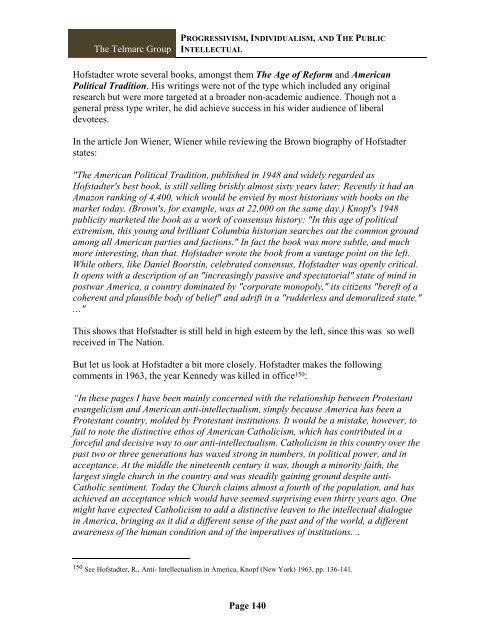progressivism, individualism, and the public ... - Telmarc Group
progressivism, individualism, and the public ... - Telmarc Group
progressivism, individualism, and the public ... - Telmarc Group
You also want an ePaper? Increase the reach of your titles
YUMPU automatically turns print PDFs into web optimized ePapers that Google loves.
The <strong>Telmarc</strong> <strong>Group</strong><br />
PROGRESSIVISM, INDIVIDUALISM, AND THE PUBLIC<br />
INTELLECTUAL<br />
Hofstadter wrote several books, amongst <strong>the</strong>m The Age of Reform <strong>and</strong> American<br />
Political Tradition. His writings were not of <strong>the</strong> type which included any original<br />
research but were more targeted at a broader non-academic audience. Though not a<br />
general press type writer, he did achieve success in his wider audience of liberal<br />
devotees.<br />
In <strong>the</strong> article Jon Wiener, Wiener while reviewing <strong>the</strong> Brown biography of Hofstadter<br />
states:<br />
"The American Political Tradition, published in 1948 <strong>and</strong> widely regarded as<br />
Hofstadter's best book, is still selling briskly almost sixty years later: Recently it had an<br />
Amazon ranking of 4,400, which would be envied by most historians with books on <strong>the</strong><br />
market today. (Brown's, for example, was at 22,000 on <strong>the</strong> same day.) Knopf's 1948<br />
<strong>public</strong>ity marketed <strong>the</strong> book as a work of consensus history: "In this age of political<br />
extremism, this young <strong>and</strong> brilliant Columbia historian searches out <strong>the</strong> common ground<br />
among all American parties <strong>and</strong> factions." In fact <strong>the</strong> book was more subtle, <strong>and</strong> much<br />
more interesting, than that. Hofstadter wrote <strong>the</strong> book from a vantage point on <strong>the</strong> left.<br />
While o<strong>the</strong>rs, like Daniel Boorstin, celebrated consensus, Hofstadter was openly critical.<br />
It opens with a description of an "increasingly passive <strong>and</strong> spectatorial" state of mind in<br />
postwar America, a country dominated by "corporate monopoly," its citizens "bereft of a<br />
coherent <strong>and</strong> plausible body of belief" <strong>and</strong> adrift in a "rudderless <strong>and</strong> demoralized state."<br />
…"<br />
This shows that Hofstadter is still held in high esteem by <strong>the</strong> left, since this was so well<br />
received in The Nation.<br />
But let us look at Hofstadter a bit more closely. Hofstadter makes <strong>the</strong> following<br />
comments in 1963, <strong>the</strong> year Kennedy was killed in office 150 :<br />
“In <strong>the</strong>se pages I have been mainly concerned with <strong>the</strong> relationship between Protestant<br />
evangelicism <strong>and</strong> American anti-intellectualism, simply because America has been a<br />
Protestant country, molded by Protestant institutions. It would be a mistake, however, to<br />
fail to note <strong>the</strong> distinctive ethos of American Catholicism, which has contributed in a<br />
forceful <strong>and</strong> decisive way to our anti-intellectualism. Catholicism in this country over <strong>the</strong><br />
past two or three generations has waxed strong in numbers, in political power, <strong>and</strong> in<br />
acceptance. At <strong>the</strong> middle <strong>the</strong> nineteenth century it was, though a minority faith, <strong>the</strong><br />
largest single church in <strong>the</strong> country <strong>and</strong> was steadily gaining ground despite anti-<br />
Catholic sentiment. Today <strong>the</strong> Church claims almost a fourth of <strong>the</strong> population, <strong>and</strong> has<br />
achieved an acceptance which would have seemed surprising even thirty years ago. One<br />
might have expected Catholicism to add a distinctive leaven to <strong>the</strong> intellectual dialogue<br />
in America, bringing as it did a different sense of <strong>the</strong> past <strong>and</strong> of <strong>the</strong> world, a different<br />
awareness of <strong>the</strong> human condition <strong>and</strong> of <strong>the</strong> imperatives of institutions. ..<br />
150 See Hofstadter, R., Anti- Intellectualism in America, Knopf (New York) 1963, pp. 136-141.<br />
Page 140












